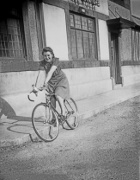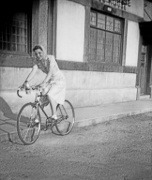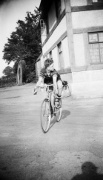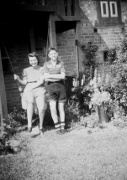 |
 |
 |
 |
| Eileen on a cycle ride. 1941. |
Me on a cycle ride. 1941. |
Maurice on a cycle ride. 1941. |
Eileen and Maurice after the cycle ride in the back garden of 12 Roland Avenue, Wilford. 1941 |
I loved swimming, and the Nottingham Swimming Baths were open throughout the year. Often I would go there with Gladys. With Eileen, or maybe Gladys, and sometimes my cousin Maurice Green I would go cycling. We travelled long distances and all without the help of signposts, village names or railway station signs, because these had all been removed when invasion was threatened.
The staff at the bakery planned evening visits to the Theatre Royal to see opera, ballet, and plays. If we wished we could pay two shillings and six pence a week to cover the cost of tickets etc. I would often prepare a buffet meal for everyone to eat before we left for the theatre.
We reached our third wartime Christmas in December 1941, and on Christmas Eve Mum and Dad were at the bus-stop at the Wilford cross roads. Dad decided to go across to Wilford House which was now an army headquarters. He spoke to the sentry and invited him to come to us for Christmas Day and to bring a comrade.
Not two but three soldiers arrived at our house the next day. They introduced themselves as Charlie Jones, Fred Gibson and Bob Jones, and explained they all had been on guard duty together so choosing two was impossible. There were nine of us around the table for Christmas dinner and at teatime. Fred told us about his wife and young son. Charlie talked a lot: he had, he said, been in France soon after war was declared and had escaped from the beach at Dunkirk. I thought he was a handsome rogue.
After Christmas I was on the upper-deck of a bus returning to Wilford. Charlie Jones saw me and although there were other vacant seats he politely asked passengers who were sitting next to me to move so that he could talk to me. I was amused because most of the people knew me and I thought they were going to think I had a soldier friend. In fact Charlie talked mostly about Eileen and he wanted to know where she worked and how he could get to know her.
In 1942 my brother-in-law Jack was in Singapore when the Japanese attacked. The British garrison surrendered and there was no news of what had happened to Jack. It would be a long time before we knew but Edna said she had "inner knowledge" that he was alive.
Since Christmas, Bob had regularly kept in touch with my family and me. He had been invited to come for an evening meal whenever he was off duty. He continued to visit us after he had been moved to Magdala Road, Nottingham, and also later when he had been moved to Derby he would journey over on the bus.
Bob and I would sometimes arrange to meet in Nottingham or Derby and visit a cinema or the theatre. I remember that we saw the play "The House on the Bridge" on one occasion. Bob and a number of the members of his unit won tickets to the Christmas pantomime at the Theatre Royal. One of the ATS girls could not go so Bob bought her ticket so that I could see the panto with Bob and all his friends. However, it was Christmas Day and I was working, so I had to rush home to change before leaving to meet Bob at the theatre.
On May 31st 1943 Eva gave birth to Roger (Roger Gordon Patrick Stones), her first child, in a nursing home in West Bridgeford. I cycled there from work to see the baby and to take some chocolates for Eva. Later, when Eva had returned to their home in Wollaton, I was able to visit and take Roger out in his pram. One of my favourite walks was to the canal where I could see the boats pass by. Paths led through a marshy area and I remember seeing masses of tall reeds.
I spent little time at home and I wonder if I should have kept Mum company more. But I had become rather independent and this may have been because of my schooldays at West Bridgeford and I was what was later called a 'latchkey kid'.
In early spring 1944 Bob arrived at 12 Roland Avenue dressed in his shabby work uniform. His hand was bandaged from an accident and his face had patches of blue antiseptic dye because he had caught impetigo. The car that had taken him to Ruddington Army Medical Unit had broken down and he was making his way back to Magdala Road. He was given leave and went home to his parents at Watford to recover. While he was there a medical officer wrongly diagnosed diphtheria and put him in an isolation hospital! It was three weeks before I next saw him and he was fit again. The isolation was very strict, even our letters were 'ovened'.
On Mothering Sunday 1944 I helped prepare bunches of flowers for the children to give to their mums at the church service. One of the little girls there had German measles and soon most of the children and some of the adults also had it - I caught it too! This was scary because Eva was expecting her second child, and she had never had German measles. Eva did not catch it and her second son Martin was safely born on the 21st May 1944. By then I was declared free of infection and I was able to help look after Roger for her.
I always liked Eva's company, and I spent lots of time at her home in Woollaton. It was fun to wash, dress and play with the children. We all enjoyed it when Bob, who had by now moved to Derby, came to Woollaton on the Derby to Nottingham bus to join us. In June 1944 Bob and I were with Eva and the boys, when Leonard came home on leave. He was with an Anti Aircraft Battery in Southern England and he told us that he had seen flying bombs and had fired their guns at them. These were the first of the V-1 'doodlebugs'.
 Home
Home